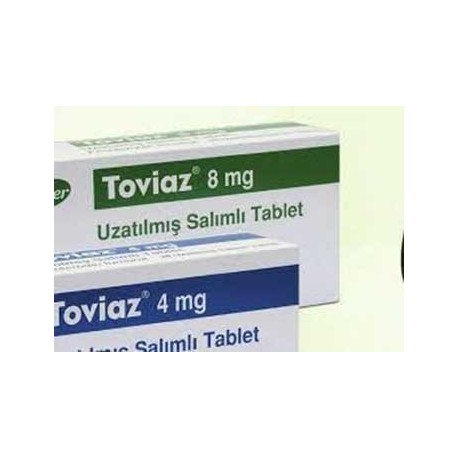 View larger
View larger Toviaz (fesoterodine fumarate) 28 Extended Release Tablet
New product
BUY MORE PAY LESS
| Quantity | Discount | |
|---|---|---|
| 2 | 5% | |
| 3 | 10% | |
| 4 | 15% | |
| 5 | 20% |
Volume discounts
| Quantity | Discount | You Save |
|---|---|---|
| 2 | 5% | Up to $5.40 |
| 3 | 10% | Up to $16.20 |
| 4 | 15% | Up to $32.40 |
| 5 | 20% | Up to $54.00 |
More info
TOVIAZ extended-release tablet
It is taken orally.
Active ingredient
4 mg of fesoterodine fumarate (equivalent to 3.1 mg of fesoterodine)
Excipients
Xylitol, lactose monohydrate, microcrystalline cellulose, hypromellose, glycerol dibehenate / glyceryl behenate, talc, polyvinyl alcohol, titanium dioxide, macrogol 3350, soy lecithin, indigo carmine aluminum lacquer (E132)
1. What is TOVIAZ and what is it used for?
TOVIAZ is a medicinal product called antimuscarinic, which reduces the movement of the overactive bladder and treats its symptoms. 1 extended-release tablet contains 4 mg of fesoterodine fumarate equivalent to 3.1 mg of fesoterodine.
Each TOVIAZ 4 mg extended-release tablet; light blue, oval, biconvex, printed and film-coated. Packaged in blisters containing 14, 28, and 84 extended-release tablets.
TOVIAZ treats symptoms of an overactive bladder such as:
• Inability to control your bladder while emptying following urgency (urge incontinence
called)
• Sudden need to empty your bladder (called squeezing)
• Having to empty your bladder more often than usual (called increased urination)
2. How to use TOVIAZ?
Instructions for proper use and dose/frequency of administration
• Take TOVIAZ exactly as your doctor has told you. if you are not sure
Consult your doctor or pharmacist.
• The recommended starting dose of TOVIAZ is one 4 mg tablet once a day. you have given medicine
depending on the response, your doctor may give you a higher dose; 8 mg tablet once a day.
Application route and method
• You should swallow your tablet whole with a glass of water. Do not chew the tablet.
• It may be easy to take the medicine at the same time each day to help you remember to take TOVIAZ.
different age groups
Use in children
TOVIAZ is not recommended for use under the age of 18.
Use in the elderly
No dosage adjustment is required in elderly patients.
Special use cases
Kidney/Liver failure:
You should not use TOVIAZ if you have serious liver problems.
If you have a kidney or liver condition, talk to your doctor before taking TOVIAZ.
You should talk. You may need to use a lower dose depending on the situation.
If you have the impression that the effect of TOVIAZ is too strong or too weak, talk to your doctor or pharmacist.
If you use more TOVIAZ than you should
If you take more tablets than you were told to take, or if someone else accidentally takes your tablets, contact your doctor or hospital immediately. Show them your tablet pack.
If you have used more than you should use from TOVIAZ, talk to a doctor or pharmacist.
If you forget to use TOVIAZ
If you forget to take a tablet, take it as soon as you remember, but do not take more than one tablet a day.
Do not take a double dose to make up for forgotten doses.
Effects that may occur when treatment with TOVIAZ is terminated
Do not stop taking TOVIAZ without talking to your doctor because your overactive bladder symptoms may recur or get worse when you stop taking TOVIAZ.
If you have any further questions on the use of this product, please consult your doctor or pharmacist.
3. What are the possible side effects?
Like all medicines, there may be side effects in people who are sensitive to the substances contained in TOVIAZ.
Very common side effects (seen in more than 1 in 10 patients) Your mouth may be dry. This effect is usually mild or moderate. This poses a greater risk for dental caries. Therefore, brush your teeth regularly with fluoride toothpaste twice a day.
Common side effects (affecting 1 in 100 to 1 in 10 patients)
• dry eye
• Constipation
• Difficulty digesting food (dyspepsia)
• Trouble or pain when emptying the bladder (dysuria)
• Dizziness
• Headache
• Pain in the stomach
• Diarrhea (diarrhea)
• Feeling sick (nausea)
• Difficulty sleeping (insomnia)
• Dryness in the throat
Uncommon side effects (affecting 1 in 1000 to 1 in 100 patients)
• Urinary tract infection
• Sleepiness (somnolence)
• Difficulty in tasting (dysgeusia)
• Severe dizziness (Vertigo)
• rash
• Dryness on the skin
• Feeling of discomfort in the stomach
• Gas (flatulence)
• Difficulty emptying the bladder completely (urinary retention)
• Delay in urination (urinary hesitation)
• Extreme tiredness (fatigue)
• Increased heart rate (tachycardia)
• Liver problems
• Cough
• Dryness in the nose
• Throat ache
• Reflux
• Blurred vision
• Palpitations
Rare side effects (occurring between 1 in 10000 and 1 in 1000 patients)
• Swelling of the face and throat as a result of allergies (angioedema)
• Hives
• Confusion

